商学部(塾外用) - 慶應義塾大学-塾生HP
商学部(塾外用) - 慶應義塾大学-塾生HP
商学部(塾外用) - 慶應義塾大学-塾生HP
Create successful ePaper yourself
Turn your PDF publications into a flip-book with our unique Google optimized e-Paper software.
COMPREHENSIVE STUDIES OF INTERNATIONAL<br />
RELATIONS 2credits (Spring)<br />
国際関係概論 2単位 (春学期)<br />
Multi-Faceted International Relations<br />
Lecturer ABE, TADAHIRO<br />
講師 安部 忠宏<br />
Course Description:<br />
At the outset of the 21st century, people expected that they could enjoy<br />
real peace and prosperity in the new century as a member of the<br />
international community where the global structure turned into the post-<br />
Cold-War regime from the Cold-War regime. The reality, however, was to<br />
the contrary as we see various incidents taking place in the international<br />
arena: various regional conflicts, successive terrorist attacks,nuclear arms<br />
development allegedly pursued in the supposedly war-less world with the<br />
prevailing NPT and so forth. In the field of economy, a prospect of<br />
development of a country is more hinged upon politically maneuverable<br />
supply of energy and natural resources in the international community, etc.<br />
People are living in the age of uncertainty. It is more important for us,<br />
under these circumstances, to try to understand international relations in a<br />
more comprehensive manner. We need to think about our future based on<br />
an accurate knowledge on the reality of the multi-faceted international<br />
relations, built upon various kinds of causality among various factors such<br />
as economy, politics and security considerations.<br />
So, in my lecture, I would like to focus on major playing factors and<br />
mechanisms which support multi-layer international/regional relations,<br />
such as ASEAN, APEC, NATO, OSCE, NPT, WTO as well as bilateral<br />
relations among Japan,US, North-Eastern/South-Eastern Asian countries<br />
and European countries. I also intend to touch on horizontal issues such as<br />
International Economy/Trade, Human Security, Official Development<br />
Assistance, etc. Eventual target of my lecture is to explore a student's<br />
capability of thinking about certain kind of global structure which may<br />
help us to materialize real peace and stability for the people in the future<br />
generation.<br />
Textbooks:<br />
・Nye,Joseph. " Understanding International Conflicts --- An Introduction<br />
to Theory and History ". Pearson Education Inc.<br />
Reference Books:<br />
・Gilpin,Robert. " The Political Economy of International Relations ".<br />
Princeton University Press.<br />
・Mingst,Karen A. " Essentials of International Relations ". W.W.Norton<br />
& Co.,Inc.<br />
・Smith,Steve. " Foreign Policy ". Oxford University Press.<br />
・Kissinger,Henry. " Diplomacy ". Harper & Brothers.<br />
・Pyle,Kenneth. " Asia Policy ". The National Bureau of Asian Research.<br />
CONTEMPORARY GLOBAL ISSUES AND THE ROLE OF THE<br />
UNITED NATIONS 2credits (Fall)<br />
現代の国際問題と国連の役割 2単位 (秋学期)<br />
Multi-disciplinary approach to the study of major global issues that<br />
confront the world community in the 21st century, and the role of the<br />
United Nations and International Organizations in addressing these<br />
issues.<br />
Lecturer MALIK, RABINDER N.<br />
講師 マリク, ラビンダー N<br />
Course Description:<br />
A critical review and assessment will be undertaken of the origin and<br />
present condition of the major global issues and problems and how these<br />
are being addressed by the national governments and the international<br />
community. Special attention will be paid to the role of the United<br />
Nations and other International Organizations as a tool of global<br />
governance in addressing these issues. We shall also explore ideas and<br />
concepts of peace and security, human rights, coexistence among peoples<br />
of different cultures and other critical global issues such as poverty<br />
eradication, environmental degradation, aging society and gender issues.<br />
The objective of the course, which is suitable for students from all<br />
faculties, is to enable the students to gain a better understanding of the<br />
world around them and about the role of the United Nations so that they<br />
85<br />
are able to evaluate current and future international trends and formulate<br />
their own well thought-out opinions based on facts. It should help enhance<br />
the trans-cultural literacy and competence and enable them to interact<br />
with confidence with peoples of different cultural backgrounds and<br />
orientations in an interdependent and interlinked world.<br />
Group discussions will be an important part of the course, which will be<br />
conducted in English.<br />
The course is open to students from all faculties.<br />
Textbooks:<br />
No specific text books are assigned for the course. Photocopied<br />
handouts will be distributed as appropriate and relevant. Students are<br />
encouraged to acquaint themselves about the contemporary global issues<br />
by reading a daily newspaper or a weekly magazine and catching news on<br />
radio and television so that they can participate actively and meaningfully<br />
in the discussion. Group discussions and assignments will rely heavily on<br />
material obtained from such sources.<br />
Reference Books:<br />
The students are requested to read the following basic reference material<br />
about the United Nations System. Some or most of these documents can<br />
be accessed through the website http://www.un.org.<br />
(1) Charter of the United Nations, UN, New York<br />
(2) UN Millennium Declaration, Resolution 55/2, UN General Assembly<br />
(3) A More Secure World: Our Shared Responsibility; Report of<br />
the High-Level Panel on Threats, Challenges and Change, UN,<br />
December 2004<br />
(4) In Larger Freedom: Towards Development, Security and Human<br />
Rights for All, UN Secretary-General, April 2005<br />
(5) Investing in the United Nations: for a Stronger Organization<br />
Worldwide – Report of the Secretary-General, March 2006<br />
(6) Reports and Documents issued by the United Nations and United<br />
Nations University on the themes covered by the course<br />
(7) Newspaper articles and journals related to the topics covered by the<br />
course will be distributed in the class<br />
INTERNATIONAL DEVELOPMENT COOPERATION 2credits<br />
(Fall)<br />
国際開発協力論 2単位 (秋学期)<br />
Development and Aid in an Age of Globalization<br />
Lecturer GOTO, KAZUMI<br />
講師 後藤 一美<br />
Course Description:<br />
The twenty-first century is an era of global governance. The realm of<br />
contemporary international relations has seen the commencement of new<br />
political attempts to gradually reform existing systems in complex<br />
governance with different players and multi-tiered networks for the<br />
creation of a convivial global society, in which the common values of<br />
peace, prosperity and stability are pluralistically shared, overcoming the<br />
risks of asymmetry and tit-for-tat sequences. In this new political initiative<br />
towards an unknown world, there are some critical challenges, including<br />
the pursuit of public goals in the international community and of effective<br />
measures to reach them. In the new world of international development<br />
cooperation, aid donors and aid recipients have different dreams yet lie in<br />
the same bed with a dynamic and tense relationship. By reviewing<br />
frontline efforts in international development cooperation with a view<br />
towards sustainable growth and poverty reduction from the perspective of<br />
cooperation policies, this course is intended to provide some basic<br />
foundations and applications for the management of international<br />
development cooperation with students that are interested in the main<br />
issues of poverty and development in the developing regions, and that<br />
wish to be involved in the world of international development cooperation<br />
in the future. Several guest speakers shall be invited from international aid<br />
agencies.<br />
Textbooks:<br />
Textbook is not used in particular. Resume and list of reading materials<br />
will be available during the course and via e-mail.<br />
諸<br />
研<br />
究<br />
所



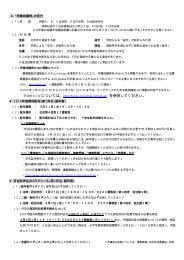
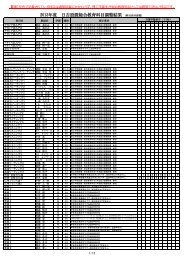
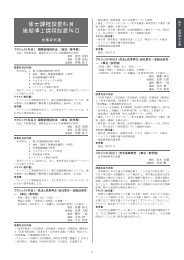
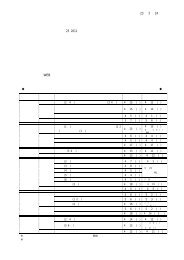
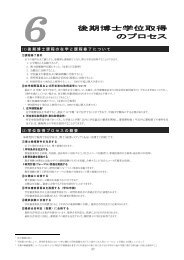
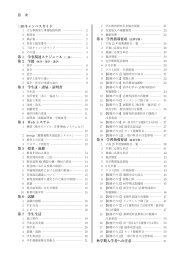



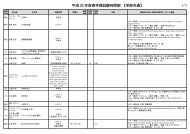

![文学部時間割表[2 ・3年生(07学則)]](https://img.yumpu.com/21046130/1/184x260/2-307.jpg?quality=85)

